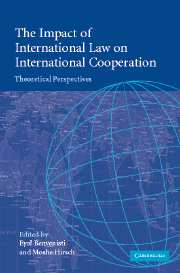Book contents
- Frontmatter
- Contents
- List of contributors
- Acknowledgments
- List of abbreviations
- 1 Introduction
- 2 International law and international relations theory: a prospectus
- 3 Pathways to international cooperation
- 4 Customary international law as a judicial tool for promoting efficiency
- 5 Reputation, compliance and development
- 6 Rethinking compliance with international law
- 7 Compliance with international norms in the age of globalization: two theoretical perspectives
- 8 Compliance and non-compliance with international norms in territorial disputes: the Latin American record of arbitrations
- 9 International trade and domestic politics: the domestic sources of international trade agreements and institutions
- 10 Human rights, developing countries and the WTO constraint: the very thing that makes you rich makes me poor?
- 11 Back to court after Shrimp–Turtle: India's challenge to labor and environmental linkages in the EC generalized system of preferences
- Index
11 - Back to court after Shrimp–Turtle: India's challenge to labor and environmental linkages in the EC generalized system of preferences
Published online by Cambridge University Press: 06 July 2009
- Frontmatter
- Contents
- List of contributors
- Acknowledgments
- List of abbreviations
- 1 Introduction
- 2 International law and international relations theory: a prospectus
- 3 Pathways to international cooperation
- 4 Customary international law as a judicial tool for promoting efficiency
- 5 Reputation, compliance and development
- 6 Rethinking compliance with international law
- 7 Compliance with international norms in the age of globalization: two theoretical perspectives
- 8 Compliance and non-compliance with international norms in territorial disputes: the Latin American record of arbitrations
- 9 International trade and domestic politics: the domestic sources of international trade agreements and institutions
- 10 Human rights, developing countries and the WTO constraint: the very thing that makes you rich makes me poor?
- 11 Back to court after Shrimp–Turtle: India's challenge to labor and environmental linkages in the EC generalized system of preferences
- Index
Summary
Introduction
The Appellate Body rulings in the Shrimp–Turtle case created a new baseline for the trade and environment debate at the WTO. The Appellate Body held that Article XX GATT can be invoked to justify measures that condition market access on policies adopted by the exporting country, contrary to the approach taken by the unadopted GATT-era Tuna–Dolphin panels. Further, the Appellate Body explicitly noted that this holding applied not only to the environmental provision at issue in the case (Article XX(g)), but to most of the paragraphs of Article XX, including, significantly, XX(a) (inter alia), the “protection of public morals”(para. 121) – a rubric often claimed to encompass fundamental labor rights.
Before Shrimp–Turtle, it was conventional wisdom that trade measures targeted at other countries' environmental (or for that matter, labor) policies could not be accommodated within the Article XX framework. But, equally, it was conventional wisdom that since preferences to developing countries granted under the Generalized System of Preferences (GSP) were voluntary and non-binding, they could be withdrawn or circumscribed on the basis of matters such as labor rights compliance, without running afoul of WTO law. In general, GSP preferences have been exempted from the Most Favored Nation (MFN) requirement in Article I of the GATT, first by a waiver, and then by a Tokyo Round Decision, called the “Enabling Clause.”
- Type
- Chapter
- Information
- The Impact of International Law on International CooperationTheoretical Perspectives, pp. 261 - 298Publisher: Cambridge University PressPrint publication year: 2004

